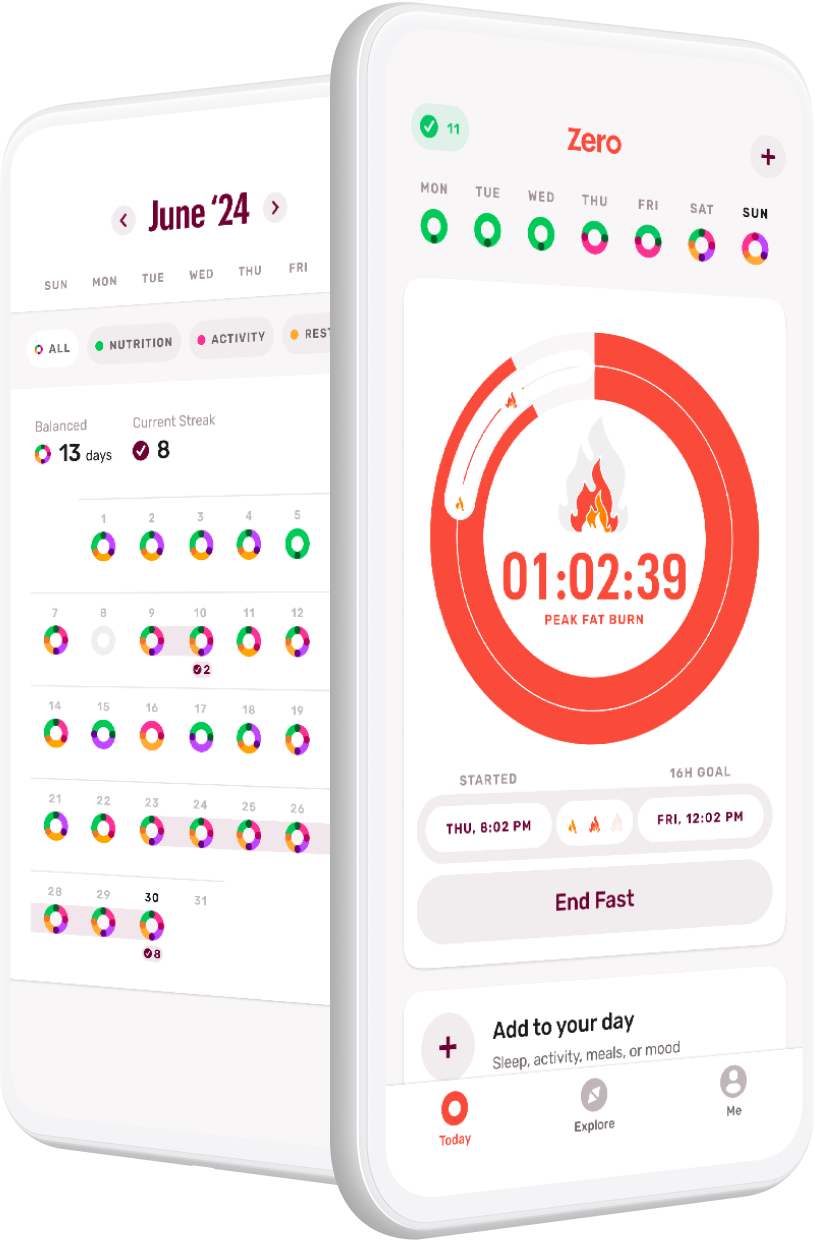Written and medically reviewed by Katya Meyers, RD
When it comes to health and longevity, you’ll find people on both sides of the nature-versus-nurture aisle. But what if it isn’t one or the other, and both sides are right? Epigenetics is a field of study that blurs the lines of this age-old debate, and describes how our health behaviors — how we eat, move, sleep, and restore — can influence how our genes are expressed.
Read on for a deep dive into the world of epigenetics, and learn how you can apply these seemingly high-brow concepts to your daily life.

What’s Epigenetics?
The prefix “epi” means “above” or “on top of” in Greek, and, fittingly, epigenetics can be described as the study of how biological mechanisms control factors beyond the DNA code. Epigenetic changes are modifications to DNA that work by turning genes on or off, without actually changing the sequence of DNA building blocks.
Both your environment and health behaviors can cause epigenetic changes, thus influencing how your genes are expressed. The collection of epigenetic changes across many cells or an entire organism is referred to as your “epigenome.”
You can think of your cells like a chef at a restaurant, with a fixed amount of specific ingredients that are akin to your DNA. Your epigenome would be analogous to a cookbook that allows your cells to create different recipes by modifying the ingredients on hand.
At the cellular level, you have about 20,000 genes, which are responsible for providing detailed instructions on how to make the proteins, or complex molecules, that are essential for life functions. Despite the fact that no two people are exactly alike, the amount of genetic variation in the human genome is only about 0.1%; this individuality is partly due to the differences in your epigenome.
Studies of identical twins indicate that methylation rates (a measure of epigenetic change, or biochemical modifications around genes that determine how they are read by cells) are highest in those who differ most in their lifestyle. This can lead to differences in phenotype (i.e., how your genes are expressed), ranging from behavioral characteristics to disease outcomes. In other words, even with identical DNA and in-utero environment, your behavior can still shape your DNA.
How Do Healthy Habits Influence Genes?
While you can’t control what DNA you’ll inherit or pass on, the good news is that you can still influence how your genes will impact your health. This is often discussed in the context of aging. Although your chronological age cannot be changed, epigenetic changes can lead to differences in your body’s biological age, or how old your cells and tissues are based on physiological evidence. You’ve likely encountered someone who seems particularly young (or old) for their age, which could indicate that they have a biological age that is significantly different from their chronological age. Research shows that biological age is more predictive of both chronic disease and death.
DNA methylation is the most well-described biomarker of biological age, and it serves as the basis for “epigenetic clocks,” which are designed to measure the rate of aging in blood and other tissues. DNA methylation is a response to oxidation and other age-related DNA damage, and can be influenced both by our genes and our modifiable health behaviors.
These epigenetic age clocks have become an exciting area of research, as they can help assess the effectiveness of lifestyle interventions that seek to slow the rate of aging and reduce age related disease. While longitudinal studies assessing the accuracy of these clocks and the link between biological age and mortality are still ongoing, biological age holds promise as a measure of how your day-to-day habits can help you live a longer, healthier life.
4 Habits for Improving Biological Age
All this talk of DNA methylation may have you scratching your head and wondering if you need a PhD in bioscience to increase your longevity. (Good news: You don’t!) The factors that can improve your biological age — and even your generational health, or the health of your potential offspring — are the same ones that you’ve already heard can improve your chances of living a longer, healthier life.
#1. Eat a High-Quality Diet
There’s never been stronger evidence for the “you are what you eat” slogan that your parents probably used to encourage you to eat more broccoli as a child. Nutrition is an incredibly potent modifiable health behavior because the nutrients you ingest can directly impact your epigenome. These nutrients are termed “epinutrients,” and you can think of them as the heavy lifters of epigenetics as they are directly responsible for speeding up biochemical reactions as well as adding or removing methyl groups to create downstream benefits, such as reducing tissue inflammation and oxidation. So, when you increase your diet quality, you may be able to slow epigenetic aging.
Epinutrients include a range of recognizable vitamins, minerals, and antioxidants, such as vitamins A and C, folate, and quercetin. They are found across a wide range of minimally processed whole foods, such as colorful veggies, fruits, whole grains, and nutrient-dense animal proteins, like liver and eggs.
#2. Get Enough Zs
You know you feel better when you get enough shut-eye, and epigenetics provides a link to the mechanisms that link sleep to our health. 7–9 hours of quality sleep is the standard recommendation for most adults, and, indeed, comprehensive lifestyle interventions that recommended 7 or more hours of sleep resulted in improved biomarkers that indicated healthier rates of aging.
Conversely, periods of reduced sleep — such as during the first few weeks of college or the early postpartum period — have been associated with accelerated biological aging. (Just what new moms want to hear!) Luckily, the effects of short-term sleep interruptions are likely transient. Just do your best to get back to a full night of sleep, ASAP!
#3. Move Your Body
Exercise in any form is beneficial for nearly all aspects of health, and it may exert its beneficial effects at least in part through your epigenome. One study that specifically examined the effects of aerobic exercise on epigenetics found that the aerobically trained individuals (defined as participating in at least 45 minutes of aerobic activity five or more days per week) displayed cellular markers indicating that their biological age was 5.4 years younger than their less active counterparts. The study also found that older aerobically trained participants showed evidence of higher rates of expression in proteins that maintain healthy blood-vessel function and protect against inflammation and insulin resistance.
Fret not: You don’t have to go all out, all the time. While gentle exercises, like Tai chi and yoga, have been associated with slower rates of methylation aging, excessive exercise — such as that in the realm of competitive elite athletes — has demonstrated a potential accelerated aging effect on your epigenome.
#4. Reduce Stress
Yoga, listening to music, and meditation are all ways to reduce your stress, but if you’re looking for an easy way to improve your epigenome, why not start with something you’re already doing thousands of times per day? Studies have shown that breathing exercises are an impactful way to reduce stress and improve aging-related biomarkers; just two 22-minute deep breathing sessions have been linked to improvements in methylation patterns. But don’t stress about reducing stress… Even a few quiet moments of deep breathing can have an impact.
Conclusion
While you can’t change what DNA you inherit, you can make choices to improve your lifespan and healthspan. By embracing the Four Pillars of Health — Nutrition, Activity, Sleep, and Restoration — you can live a longer, healthier life. So, while the message of what to do isn’t all that different from your standard health advice, exciting new evidence is emerging on how these healthy habits are changing your DNA for the better.
And if you’re worried there’s a long road ahead, it may take less time than you think to improve your health. One recent set of diet-and-lifestyle intervention studies found that both male and female participants who adhered to daily recommendations — such as a eating a healthy diet (plenty of cruciferous vegetables, dark leafy greens, seeds, and liver), intermittent fasting for at least 12 hours, hydrating with a minimum of eight cups of water, exercising for 30 minutes or more, and performing breathing exercises — resulted in an average biological age reduction of -3.23 for males to -4.6 years for females over an 8-week period!
- The Fasting Guide to Menopause, Perimenopause, and Postmenopause - April 8, 2024
- Try This Instead of That: How to Bookend Your Fasts - March 25, 2024
- 60 Names for Sugar: The Myths, The Facts, and What You Should Know - February 12, 2024






